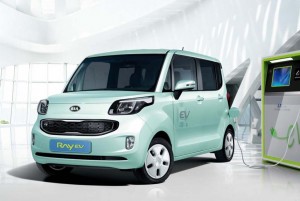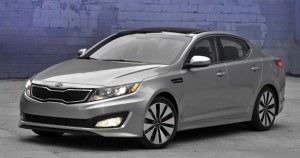Kia has charged out Korea’s first full battery-electric vehicle, a city car dubbed the Ray EV.
A virtual clone of one of the Asian maker’s conventionally powered multi-purpose minicars, the lithium-ion-powered Ray EV will get about 86 miles per charge, the maker says. And, significantly, it will outperform the gas-powered 5-door.
Like its sibling Hyundai, Kia has been slow to embrace battery power, only recently introducing its first hybrid in the key U.S. market, a version of the midsize Optima sedan. But both Korean brands have announced plans to aggressively expand their electrified offerings, with an array of conventional hybrids, plug-ins and full battery-electric vehicles, or BEVs, under development.
The Kia Ray EV uses a 16.4 kilowatt-hour lithium-ion polymer pack – about the same size as the larger Chevrolet Volt, and a third smaller than the battery pack in the Nissan Leaf. It powers a 50kW, or 67 horsepower, electric motor which turns out 123 lb-ft of torque.
The battery car takes a stodgy 15 seconds to reach 60, and though it weighs about 180 pounds more, that is still a bit faster than the city car equipped with a 1.0-liter gas engine. The BEV is rated at a top speed of 130 mph.
There are three driving modes, including Eco which delivers a range of 86 mph. The maker says the little electric can charge up in six hours using a 220-volt circuit – or as little as 25 minutes using a 440-volt quick-charge system.
The Kia Ray EV features a 7-inch LCD screen that, like other recent BEV offerings, can show the vehicle’s range on its remaining charge – as well as the charging stations within reach.
The new electric features a full range of safety features, including six airbags, stability control, hill assist and “virtual engine sound,” which is designed to alert pedestrians that the relatively silent Ray EV is cruising towards them.
There are currently no plans to market the Kia Ray EV in the U.S. – no surprise considering its miserable performance – but Kia hints it has other plans for the battery-electric vehicle space in the works.


